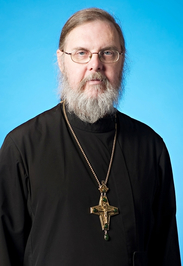Lawrence R. Farley

|
Let Us Attend, A Journey Through the Orthodox Divine Liturgy
—
published
2007
—
6 editions
|
|

|
One Flesh: Salvation through Marriage in the Orthodox Church
—
published
2013
—
3 editions
|
|

|
A Daily Calendar of Saints: A Synaxarion for Today’s North American Church
—
published
1999
—
4 editions
|
|

|
Living Faith: An Orthodox Christian Conversation with Evangelicals
|
|

|
The Gospel of John: Beholding the Glory
—
published
2006
—
2 editions
|
|

|
Unquenchable Fire: The Traditional Christian Teaching about Hell
|
|

|
Gospel of Matthew: The Torah for the Church
by
—
published
2009
—
3 editions
|
|

|
The Gospel of Mark: The Suffering Servant
—
published
2004
—
6 editions
|
|

|
The Epistle to the Romans: A Gospel For All
—
published
2002
—
3 editions
|
|

|
The Christian Old Testament
—
published
2012
—
2 editions
|
|
“Thus, it is not because the question of how the world came to be was a burning one that Genesis opens with the Creation. And the modality or method of creation is not even the main point of the Creation story. The Hebrew creation story was as much polemic as it was anything else. Its main point is not, “This is how the world came into existence,â€� but rather, “Our Jewish tribal God is sovereign over the whole world.â€� What would strike the ancients the most forcefully from the story was not the statement, “God made the world out of nothing,â€� but the statement, “Yahweh Elohim made the world”—and therefore the Hebrews who alone worship this God are assured of victory. In contemporary North America, where proponents of creation science square off against proponents of evolution in a kind of political mud wrestling, and where questions of exactly how the world came into existence dominate the discussion, it is easy to miss the main point of the Creation story. The question of the mechanics of how the world came into existence was not central, or even important. The question of which deity was sovereign was.”
― The Christian Old Testament
― The Christian Old Testament
“Let us struggle with all our powers to gain Paradise. The gate is very narrow, and don’t listen to those who say that everyone will be saved. This is a trap of Satan so that we won’t struggle. —St. Paisios the Athonite, d. 1994”
― Unquenchable Fire: The Traditional Christian Teaching about Hell
― Unquenchable Fire: The Traditional Christian Teaching about Hell
“This was not God’s plan. God planned to transcend the timeless and deadly dichotomy of “usâ€� and “them,â€� to tear down the dividing wall that separated Jew and Gentile. He planned to “gather together in one the children of God who were scattered abroadâ€� (John 11:52), to create a new people who shared a new nature. He planned a Kingdom which had no borders, needed no armies, and would need to fight no bloody wars to defend its sovereignty. This Kingdom would have no oppressive taxation, for its King was supported by the power of God alone, not by any human resources. It would have no foreign policy, no immigration restrictions, for all foreigners could instantly become citizens of this Kingdom through faith and baptism, without change of place or earthly nationality. In Christ, God was transforming the very nature of kingship and power, of salvation and defeat, of peace and war. Everything was redefined and transfigured. In Him, “old things have passed away; behold, all things have become newâ€� (2 Cor. 5:17). In this Kingdom, God made all things new (see Rev. 21:5), for it was only through this transformation that His salvation could extend to all the world, and all men could find their way home.”
― The Christian Old Testament
― The Christian Old Testament
Is this you? Let us know. If not, help out and invite Lawrence to Ĺ·±¦ÓéŔÖ.































